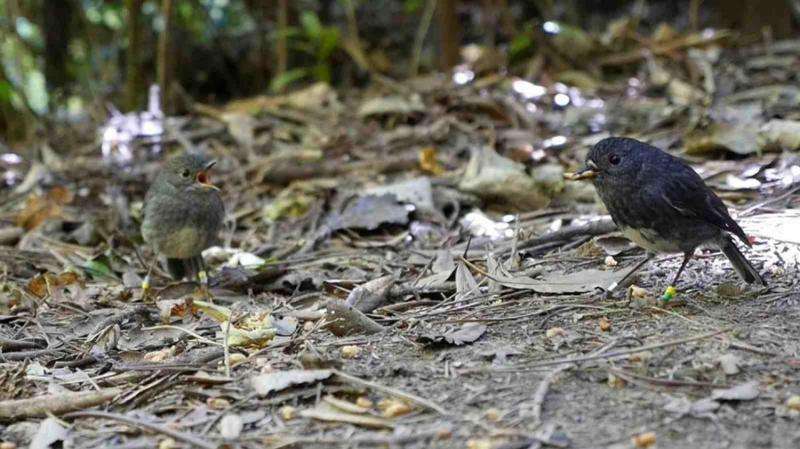'Happy wife, happy life' meaningful for birds, too

Research from Victoria University of Wellington has shown for the first time that wild male birds read their partner's behaviour to appropriately cater to her food desires.
Dr Rachael Shaw, a postdoctoral research fellow in Victoria's School of Biological Sciences, conducted a study on a group of North Island robins based at Zealandia.
The research investigated whether male robins could give their mate the type of food that she was most likely to want during reproduction.
"Robins are a monogamous, food-sharing species, so were ideal for this experiment. The experimental procedure has only previously been used in the laboratory on Eurasian jays," she says.
"We found male robins appropriately catered to their mates' desire, even when the female's behaviour was the only cue available to guide their choices.
"This suggests that females can signal their current desires to their mates, enabling males to respond to that."
Dr Shaw says the finding raises the possibility that other species might be capable of doing the same.
"In many species food sharing by the male is vital to help the female offset the energetic costs of reproduction, such as egg laying and incubation. The male's ability to give his mate what she wants could in fact be an important factor in determining the success of a pair, as well as influencing whether they stay together. These are really exciting avenues for future research."
The experiment first involved establishing female robins' eating habits. "I fed the females either meal worms or wax worms, and then gave them the choice between these two types of insect larvae. I found that after the females had eaten one type of insect, they would prefer to eat the other type when given the choice. This means that the female's desire for a particular food is affected by what she has previously eaten."
Based on this, Dr Shaw then tested if the male would also be able to choose the type of insect his mate was most likely to want (the one she had not just eaten).
"Regardless of whether or not he had seen what his mate ate first, the male still made the appropriate choices. This suggests that the female is likely to be displaying her current desire in her behaviour, and that the male is using these cues to identify the food that she wants."
The research, co-authored by Victoria's Associate Professor Kevin Burns and Professor Nicola Clayton from the University of Cambridge in the United Kingdom, was recently published in the journal Scientific Reports.
The field work and data collection was carried out by Dr Shaw with help from Victoria student Regan MacKinlay. Dr Shaw's research is supported by a Rutherford Foundation postdoctoral fellowship and a Marsden Fast Start grant from the Royal Society of New Zealand.
Previous research from Dr Shaw has revealed surprising similarities to human intelligence in robins.
Journal information: Scientific Reports
Provided by Victoria University of Wellington



















